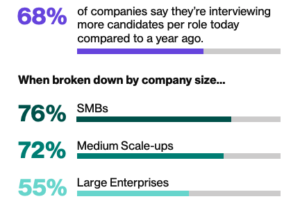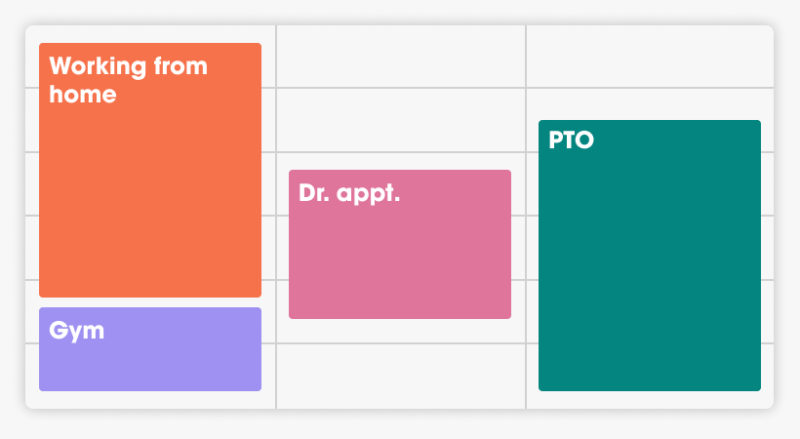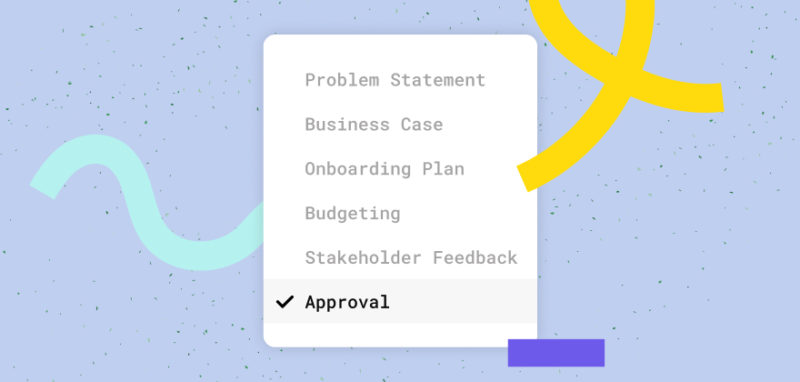
How Many Candidates Should You Interview for a Job? Hiring Best Practices
A lot of hiring managers ask, “How many candidates should you interview for a job?” What the minimum number of candidates required for an interview is a common riddle faced by many decision-makers in the recruitment process. We know organizations are interviewing more candidates for each role than they used to.
Hired surveyed 250+ professionals in tech hiring and discovered that 68% of them said they’re interviewing more candidates per role today than a year ago. Another survey finding was that “quality of hire” was a top metric for hiring teams in 2024.

In the challenging and ever-evolving world of business, one of the most important decisions a hiring manager, recruiter, startup founder, or CEO will make is who to bring on board their team. As the backbone of every organization, a quality workforce shapes the success or downfall of a company. With such high stakes, it’s crucial to be equipped with an optimal strategy when conducting interviews.
While there is no universal answer to how many candidates to interview, this blog post explores some key factors to consider when determining the number of candidates to interview for each role.
6 Things to Consider When Determining How Many Candidates to Interview for a Job1. The Complexity of the Job or Role
The complexity of the job position plays a significant role in determining the number of candidates you should interview. For roles that require advanced skills or specific experience, you might need to interview more candidates to find the ideal match. On the contrary, for positions with less complex requirements, a smaller pool might suffice. Evaluating the complexity of the role will aid in approximating the breadth of your interview pool.
Pro Tip: Alignment between hiring managers and talent teams is critical
Here’s a free template for a basic interview framework. We’ve also written a blog about getting teams organized for better efficiency and candidate experience in Want to Run Better Interviews? You Need a Pre-Interview Meeting (Free Email Template).
2. Candidate Availability
An equally significant consideration in the number of candidates to interview is the availability of qualified ones. If you are in a field or location with a limited number of qualified candidates, you may need to cast a wider net and interview more individuals. Conversely, in areas with a high concentration of professionals in your required field, you might have a larger pool of qualified applicants, allowing you to be more selective.
Hired has a career marketplace pool of high-quality, high-intent candidates for tech and sales roles. Get a live demo and see how it changes your hiring process for the better.
3. The Interview-to-Hire Ratio
Another useful method to estimate the number of candidates to interview is the ‘Interview-to-Hire Ratio.’ This ratio represents the number of candidates you need to interview before making a hire. According to research, this ratio can range from 4:1 to 20:1 depending on the industry and the role complexity. Thus, the ratio can help you figure out the potential number of interviews to conduct.
4. Quality over Quantity
While the number of interviews you conduct is crucial, it’s equally important to stress the quality of candidates over the quantity. Interviewing too many candidates can be overwhelming and time-consuming, and may not necessarily yield better results. Moreover, it can be detrimental to your employer brand if candidates feel they are merely a number in a long line of interviews. Therefore, it’s essential to maintain a balanced approach and ensure each candidate receives the attention they deserve during the interview process.
According to one of our ATS partners, Workable, the number of candidates per hire is over 70% higher than this time a year ago, largely driven by more people chasing fewer roles. With the flood of applicants coming in for each opening, efficient and effective screening plays a major role in ensuring you’re bringing candidates with the highest likelihood of success forward in the hiring process. Check out Workable to learn more about how they can help.
5. The ‘Rule of Three’
A good rule of thumb to follow is the ‘Rule of Three,’ which suggests interviewing at least three candidates for every job opening. This allows you to compare and contrast candidates effectively, ensuring a fair hiring process. However, remember that the ‘Rule of Three’ is a guideline, not a strict policy. It should be adjusted according to the role, industry, and quality of the candidates applying.
6. Adaptability is Key
Lastly, remember that flexibility and adaptability are essential in the hiring process. If you haven’t found the right candidate after interviewing a significant number, it might be a signal to revisit the job description, requirements, or recruitment strategies. A successful recruitment process should be fluid and responsive to market conditions, candidate availability, and company needs.
Insights from Talent Leader Trent KruppWhen asked, ‘How many candidates should you interview for a job,’ Trent says
“Short answer: As many as it takes. Long answer: Typically you should expect to talk to 7-10 candidates, make 2 formal offers, and receive one acceptance. Having a recruiting culture that’s focused on speed and efficiency makes a massive impact on your success.
If you’re able to go from meeting someone to presenting them with a firm offer within 7 business days, you’re going to be better than 90% of companies out there. [MAANG companies] may be able to pay higher salaries than you, but they can’t possibly compete against a 7-day end-to-end hiring cycle.
Being slow & indecisive, creating artificial scarcity (rejecting someone because they don’t have experience with THE particular JavaScript framework that you happen to use), or trying to hire people for significantly below market rates are all enemies of success.
In my personal opinion, the first one or two engineers you hire should probably be the most experienced you can find. They will be making critical architectural decisions likely to be incredibly complex and expensive to unravel in the future. You need to get it right, and being penny-wise and pound-foolish does not make sense.
Finally, these guidelines are for typical individual contributor positions. VP or Director-level hires, or positions requiring very specialized knowledge will be different.”
Do Employers Have to Interview All Applicants?No, that’s not feasible most of the time. In fact, some recruiters have discovered that by reducing friction in the application process (excellent intent) the unintended consequence is too many inbound candidates. When the hiring market is tough, and people find it “too” easy to apply, they’ll apply for lots of jobs quickly. In marketing, this is typically called the “spray and pray” approach. In both cases, targeted efforts yield better results. But what should recruiters or hiring managers do if they’re bombarded with too many applications?
Learn how to manage and even prevent this recruiting challenge in our eBook, Too Many Inbound Candidates, but Not Enough Qualified Ones? 8 Tactics to Solve It.
We also wrote a blog based on insights from our podcast for talent acquisition and recruitment professionals, Talk Talent to Me, titled How to Manage Inbound Applications & Rethink Talent Sourcing Analytics: Tips for Recruiters.
Let Hired Help You Cut Down on How Many Candidates You Need to Interview for a JobIn conclusion, there is no one-size-fits-all answer to the question of how many candidates you should interview for a job. It’s a decision that requires a clear understanding of the role, the job market, your company’s needs, and the potential talent pool. Always remember: each interview is an investment in your company’s future. Take the time to make strategic and informed decisions. Happy hiring!
Learn more about how Hired helps employers of all sizes find the right talent, right away!
Originally published May 2023. Revised by Hired Content team in August 2023, February 2024.
Related blog posts

2023 Survey Results: Top 3 Benefits Ranked by Engineers (Besides Salary)
From layoffs, hiring freezes, inflation, and the explosion of AI, we’ve seen significant shifts in...

Cost of Vacancy: Making the Case for Hiring During a Downturn
Why the cost of job vacancy matters (and how to reduce it) As a recruiter, it’s up to...

Diversity Isn’t Optional: How 3 Talent Leaders Made DEI an Organizational Imperative
All too often, organizations treat DEI initiatives as optional—but this approach...

Get Internal Approval for Recruiting Tools: A Step-by-Step Playbook
About this eBook Your team has big goals and you’ve identified a new recruiting tool to...

Raise the Bar in 2023: Strategies from Top Employers Winning Tech Talent (VIDEO)
Need insight to plan your recruiting and hiring strategies for 2023? Watch this on-demand...

Re-engineering Your 2023 Tech Hiring Strategy (Watch VIDEO on Demand)
If you are in the market to hire qualified software engineers, you need to modify your 2023...

